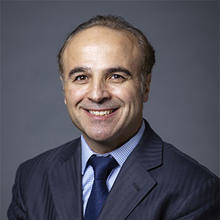- July 14, 2025
Boards with higher social capital enjoy more market freedom to engage in potentially risky strategic alliances — to the ultimate benefit of their firms.
- July 7, 2025
Auditors with less common first names are more likely to deviate from auditing norms. But is their individualism an asset or a liability?
- February 27, 2025
Since 2008, the meteoric rise of index funds has produced extreme consolidation of corporate ownership. So far, the outcomes for firms are a mixed bag.
- November 21, 2024
We know from prior research that savvy investors respond to ESG data. But a pair of finance professors have discovered perhaps the most lucrative wrinkle in this strategy.
- August 22, 2024
Artificial intelligence can perform peer firm selection—a key task for investors—at least as accurately as well-established alternative algorithms and human experts, according to research by Costello profs Long Chen and Yi Cao.
- July 22, 2024
You can tell a lot about a hedge fund’s quality—and long-term performance—from the market climate in which it was launched.
Lin Sun, assistant professor of finance, recently published a paper in Review of Finance that compares hedge funds formed in high-demand, or “hot,” markets to those produced in a “cold” market climate. - April 18, 2024
Bo Hu, an assistant professor of finance at Mason, is developing new research methods to better capture the intricate, interlinked dynamics of financial markets.
- April 3, 2024
Mason accounting professor, David Koo, goes back through history to trace how financial reporting requirements affect investors’ long- vs. short-term thinking.
- May 4, 2023
Analysts and top executives are usually not on the same page –or even reading the same book.
- March 15, 2023
A George Mason University professor is working on ways to measure one of the great intangibles of today’s companies: employee talent.










